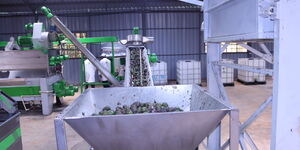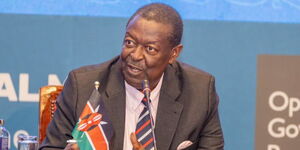Kenyans are set to continue accessing cheaper loans for the next two months following the Central Bank of Kenya's (CBK) decision to lower the base lending rate for the sixth successive time since August last year.
CBK, in its latest Monetary Policy Committee (MPC) report published on Tuesday, June 10, announced that it had reduced the base lending rate by 25 basis points to 9.75 per cent from 10.00 per cent.
According to CBK Governor Kamau Thugge, the decision to lower interest rates was to stimulate lending by banks to the private sector and support economic activity while ensuring exchange rate stability.
Thugge also revealed that the banking sector remains stable and resilient, with strong liquidity and capital adequacy ratios. The ratio of gross non-performing loans (NPLs) to gross loans stood at 17.6 percent in April 2025 compared to 17.2 percent in February.
Increases in NPLs were noted in trade, personal and household, tourism and hotels, and building and construction.
Additionally, the growth in commercial bank lending to the private sector stood at 2.0 percent in May 2025 compared to 0.4 per cent in April, and -2.9 per cent in January 2025.
This reflects improved demand in line with the declining lending interest rates, and the dissipation of exchange rate valuation effects on foreign currency-denominated loans following the appreciation of the Shilling.
Meanwhile, the MPC observed that the overall inflation was expected to remain below the midpoint of the 5±2.5 percent target range in the near term.
Further, it observed that with central banks in major economies having lowered their lending rates, despite the ned for a cautious approach to that.
Additionally, the MPC noted that global growth is projected at 2.8 percent in 2025 compared to 3.3 percent in 2024, mainly reflecting significant downward revisions to growth in the United States and China, due to effects of higher tariffs on U.S. imports, and retaliatory tariffs by trading partners.
''Global headline inflation has moderated, but is projected to decline at a slower pace due to the expected inflationary impact of higher trade tariffs. Central banks in major economies have adopted a more cautious approach in lowering policy rates,'' the statement from the MPC read in part.
International oil prices have moderated due to increased production and subdued global demand mainly from China, but the risk of potential volatility remains elevated due to higher tariffs on imports and persistent geopolitical tensions, the MPC added.
Despite the current economic conditions, the MPC noted that food inflation has eased slightly, mainly driven by lower cereals and sugar prices inflation, but edible oils price inflation remains elevated.












